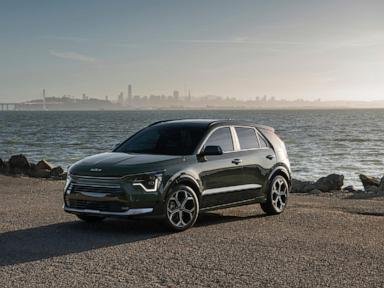Many car shoppers simply want a vehicle that’s practical, easy to drive and relatively inexpensive. High fuel economy is increasingly a popular desire as well. If this sounds like what you’re looking for in your next vehicle, consider the 2024 Kia Niro or the 2024 Toyota Corolla Cross Hybrid.
The Kia Niro is fresh from a redesign last year. It’s one of Kia’s smaller crossover SUVs and it stands out with its distinctive styling, standard hybrid powertrain and plentiful technology features. Much of the same can also be said of Toyota’s Corolla Cross Hybrid. This fuel-sipping spinoff of the Corolla Cross is similarly fresh, introduced just last year. It’s also loaded with popular features and is a lot more practical than a regular Corolla sedan. Edmunds’ auto experts put these hybrid SUVs head-to-head to see which one offers more for your money.
Under the hood of the Niro is a four-cylinder hybrid electric powertrain that sends 139 horsepower to the front wheels. During testing, Edmunds found acceleration is pretty leisurely. The Niro is pleasantly punchy at city speeds but it rapidly runs out of steam on the highway. The trade-off is great fuel economy. Depending on the trim, its EPA-estimated combined average is a remarkable 49 to 53 mpg.
Motivating the Corolla Cross Hybrid is a 196-horsepower four-cylinder hybrid electric powertrain that sends power to all four wheels. That’s right, the Corolla Cross Hybrid comes standard with all-wheel drive. All-wheel drive is not available on the Niro. Its 42 mpg combined average trails the Niro’s, yet acceleration is stronger. Edmunds found the Corolla Cross Hybrid needed 7.9 seconds to sprint from zero to 60 mph — almost 2 seconds quicker than the Niro.
If great fuel economy is your top priority, the Niro wins. But Edmunds found the Corolla Cross Hybrid’s quicker acceleration and standard all-wheel drive to be worth the trade-off.
Winner: Corolla Cross Hybrid
Credit Kia and Toyota for packing in so many features into these budget-minded SUVs. In base format, they each come standard with keyless entry and ignition, an 8-inch infotainment touchscreen, and wireless connectivity for Apple CarPlay and Android Auto smartphone integration. Both also offer a robust set of driver assistance features including lane keeping assistance, blind-spot warning and adaptive cruise control.
There are a few aspects that help the Niro pull ahead. For one, it starts at $28,315, including destination fees. That’s about $1,200 less than the Toyota’s price of $29,570. Kia also offers top trim levels for the Niro that come with upscale features such as ventilated front seats and a premium sound system. You can’t get these on the Corolla Cross Hybrid.
The Niro is backed by a lengthy five-year/60,000-mile basic warranty paired with 10 years/100,000 miles of powertrain coverage. Toyota offers a more industry standard combo of three years/36,000 miles (basic) and five years/60,000 miles (powertrain), though it’s worth noting the Corolla Cross Hybrid has a two-year/25,000-mile free maintenance plan.
Winner: Niro
Both of these SUVs are maneuverable in city driving and reasonably comfortable during highway jaunts. The Corolla Cross Hybrid rides more smoothly over bumps, but otherwise they’re pretty similar for all-around comfort. Cargo space is also similar. You’ll be able to fit a decent amount of stuff behind the rear seats or fold them down to load larger items.
The Niro does have one big advantage compared to the Toyota: rear legroom. Measuring in at 39.8 inches, the Niro has nearly 8 inches more than the rear confines of the Corolla Cross Hybrid. That extra space makes the Niro more comfortable for taller teens or adults sitting in back. Parents needing to install bulky child safety seats will appreciate it too.
Winner: Niro
The Toyota Corolla Cross Hybrid is a solid and sensible choice. It goes about its business with a minimum of fuss and feels built to last. Yet the Niro has better fuel economy, added rear legroom and a more upscale interior. It’s sensible with a bit of pizzazz.
____________
This story was provided to The Associated Press by the automotive website Edmunds. Nick Kurczewski is a contributor at Edmunds.
